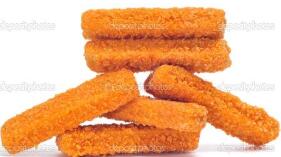
For a processed food, the level of sustainability is surprising. I wondered if any fish sticks sold in the United States were made from sustainable seafood sources. Since there isn't a comprehensive report, I did a little digging.
Gorton's is the first brand that comes to my mind when I think of fish sticks, and their Crunchy Breaded Fish Sticks are made with 100 percent whole wild-caught Alaska pollock. The product carries a Trusted Catch symbol, which is a reference to Gorton's program that guarantees the seafood comes from certified sources. According to the company website, the program "goes beyond certification and enacts real change in the industry and on the water."
Another big player in the fish stick market, Mrs. Paul's, doesn't have any sustainability information on their fish sticks specifically, but its website says that over 80 percent of the company's seafood products are from sustainable sources. They have a three-year plan to make that 100 percent. Van de Kamp's has the same exact information on its website; both brands are owned by Pinnacle Foods.
Ian's, a brand that makes allergy-friendly fish sticks, uses whole fillets of Marine Stewardship Council-certified sustainable Alaska pollock.
Of course, fish isn't the only ingredient in fish sticks. They're all breaded and use various amounts and kinds of oils, salts, sugars, spices and preservatives. When deciding on whether or not processed fish sticks belong in your freezer, even if the seafood is sustainable, all of the ingredients should be taken into consideration.







